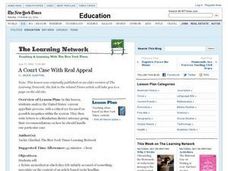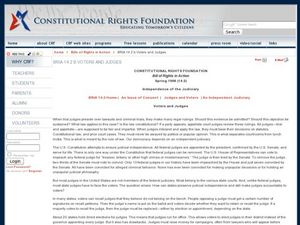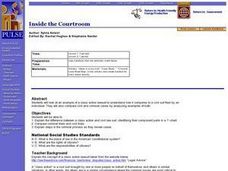School Improvement in Maryland
Court Proceedings Civil Cases
What's the difference between civil and criminal law? How do the court proceedings differ in these two types of trials? How do the standards of proof differ? Why do these differences exist? As part of their examination of the...
Curated OER
Lessons in Legal Ethics: Crime and the Media
High schoolers examine a variety of ethical issues that arise in criminal cases. They get into groups, and perform a case study of a real situation in which many of these ethical issues came up. All of the worksheets needed to...
Curated OER
Lesson 5: In the Courtroom: Understanding the Players and the Action
Young lawyers put Goldilocks on trial as they develop an understanding of the legal system in the final lesson plan of this five-part series. After learning about key terms relating to litigation, students are assigned roles...
Curated OER
Government Lesson Plan: Lesson Plan 9
Learners examine and compare/contrast the steps of criminal and civil cases. They define key vocabulary terms, develop an outline of a criminal and civil trial, and analyze the differences in standards of proof in legal cases.
Curated OER
JACK - CRIMINAL OR VICTIM?
Students to use all levels of Bloom's taxonomy to look at the case of 'Jack and the Beanstalk' through the eyes of our present legal system. They analyze the story to determine if Jack was a criminal or a victim.
Curated OER
Trial Simulation Project on First Amendment Cases
Students engage in research and role play to discover the history and importance of certain First Amendment court cases. They act out the cases in different roles in order to understand different perspectives from the prosecution to the...
Curated OER
When Court Cases Get Appealed
High schoolers read and analyze two functional documents. They predict outcomes using prior knowledge and documents. Students draw conclusions about how court cases are appealed. They list the parts of a court case.
Curated OER
A Court Case with Real Appeal
Students analyze the United States' current appellate process, with a critical eye focused on possible inequities within the system. They then write letters to a Manhattan district attorney giving their recommendations on how he should...
Curated OER
The Case of the Plugged Toilets:
Learners identify the process for settling a criminal dispute (how are the facts of the case presented; how is the dispute resolved?, and
Deliberating in a Democracy
Crime and Punishment
Should the United States ban the death penalty? Scholars use real-life examples of criminal activity to come to their own conclusions on the death penalty. Primary source documents, as well as video clips, open the issue of capital...
Curated OER
Moot Court Preparation
Twelfth graders prepare themselves for a mock moot court. In groups, they are presented with an overview of each activity and research appellate cases related to the topic given to them. They identify regions of the country that have...
Curated OER
The Leed's footballers' trial
Students explore what happens when someone is tried for a crime. They expand their knowledge of the name "Criminal Justice System" and develop discussion skills. Students read the story Leeds footballer guilty of fighting in public. ...
Curated OER
Criminal Law: Rape
Students explore the different degrees and types of rape as defined in the state of Washington. They role-play as prosecutors, defense attorneys, and judges, with one of each in different groups. The attorneys present their cases and the...
Curated OER
Mediation/Conciliation
Twelfth graders discuss the court system in Japan, and assume roles of family members and friends of air crash victims. They discuss whether they would file suit against airlines, compare methods of achieving justice in United States and...
iCivics
James Bond in a Honda? Trial Simulation
Your class members will take on the roles of jury members in this exciting simulation. After reading a detailed script and reviewing pieces of evidence, they will determine whether Honda violated copyright and copied James Bond.
Curated OER
Reporter rights vs. legal access...
Students write an article to inform readers about confidentiality with reporters, attempting to find local lawyers and journalists to explain the issues as they relate to them. Students research past cases and the status of the current...
Curated OER
Voters and Judges
Students analyze the work on independent judiciaries. In this federal courts lesson, students listen to their instructor lecture on details of federal cases. Students respond to discussion questions and participate in an activity...
Curated OER
Allen's Dilemma
Students read, discuss and act out an actual case study dealing with a juvenile crime. They complete discussion questions associated with case study.
Curated OER
Inside the Courtroom
Twelfth graders explain the difference between a class action and civil law suit. In groups, they compare and contrast criminal and civil trials and review various cases. They determine the place of law in the American constitutional...
Curated OER
Military tribunals
Ninth graders explore the role of government on terrorism. In this current events lesson, 9th graders create a trial for an individual who has been suspected for terrorism. Students present the case to the jury.
Curated OER
Mock Trial
Learners rewrite a traditional fairy tale to represent the viewpoint of the villain. They participate in a mock trial of that villain in which all regular court participants (judge, jury, defendant, witnesses, plaintiff, etc) play roles.
Curated OER
Introduction to Mediation
Students are introduced to the use of mediation in court cases. In groups, they identify the different scenerios that could mediation could be used and discuss other alternatives to a solution. They practice mediating various situations...
Curated OER
Tort Liability: Mock Trial
Students explore the trial process and the tort concept of host liability.
Curated OER
Seeing the Courtroom and Legal System Through the Eyes of a Child
Students understand that law is a tool that provides for the protection of our individual rights and at the same time makes it possible for groups to live together.























